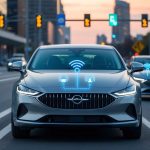Future of Mobility
The future of mobility is shaped by rapid advancements in technology and significant shifts in market dynamics. Key trends include the incorporation of cutting-edge technologies and a growing market for sustainable transport options.
Emerging Technologies
Emerging technologies are revolutionizing the mobility landscape. Autonomous driving systems are becoming more sophisticated, minimizing human intervention. Electric vehicles (EVs) continue to improve in terms of battery life and charging speed, addressing range anxiety concerns. Hydrogen fuel cell technology is also gaining traction as an alternative to traditional batteries, offering quicker refueling times.
Integration of Internet of Things (IoT) enables smarter transportation networks. Vehicles can communicate with each other and infrastructure to optimize routes and reduce congestion. Enhanced connectivity through 5G networks supports real-time data exchanges, improving safety features and overall vehicle performance.
Projected Market Growth
The market for sustainable mobility solutions is projected to grow significantly. Electric vehicle sales are expected to increase as government policies favor green technology. Incentives, such as tax breaks and subsidies, make EVs more attractive to consumers. Infrastructure for charging stations is expanding, making electric cars more convenient.
Hybrid vehicles also remain integral, offering a balance between electric and gasoline power. Their ability to switch between power sources provides flexibility for longer trips. The rise of shared mobility services, like ride-hailing and car-sharing, contributes to the market growth. Consumers are increasingly adopting these services for their cost-effectiveness and convenience.
Comparative Analysis
Both hybrid and electric vehicles offer unique benefits and challenges, impacting performance and total cost over time. Understanding these differences can help drivers make informed decisions.
Hybrid vs. Electric: Performance Comparison
Hybrids combine an internal combustion engine with an electric motor, offering versatility in both city and highway driving. They usually provide better mileage than conventional gasoline cars, especially in urban settings due to regenerative braking.
Electric vehicles (EVs), powered solely by batteries, excel in smooth acceleration and quieter operation. Their performance is generally superior in terms of torque and immediate power delivery. They are ideal for urban commutes and short trips as they offer a consistent, seamless driving experience. Charging infrastructure and range can vary, influencing performance based on location and driving habits.
Total Cost of Ownership Over Time
Hybrids often have a higher upfront cost than gasoline cars but usually cost less than EVs. Maintenance costs are somewhat lower than traditional cars due to the electric motor’s assistance reducing engine wear. Fuel savings also contribute to long-term cost benefits.
Electric vehicles, while typically pricier initially, offer significant savings over time. They require less maintenance compared to hybrids and gasoline vehicles because there are fewer moving parts. Charging costs are generally lower than fuel costs, contributing to ongoing savings. The cost of battery replacement can be a consideration, although it is expected to decrease as technology advances and production scales up. Tax incentives and credits can further reduce overall ownership expenses for EVs.



